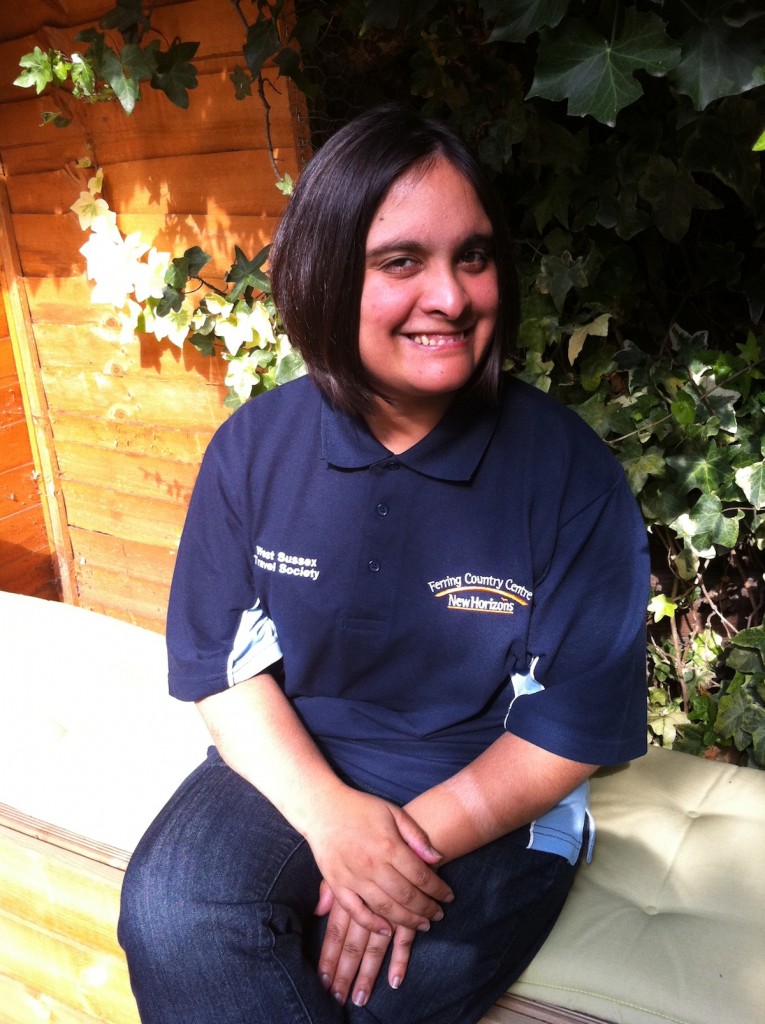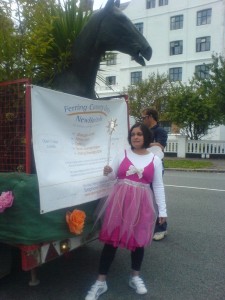It was the sort of toxic mixture of elements and multiple assault on the senses that would until recently have triggered some challenging behaviour in my sister; a bustling crowd, loud music, the company of strangers and – to add insult to injury – an extraordinary day with no familiar routine.
But not only was 22-year-old Raana Salman at the very heart of the carnival throng in my parents’ Sussex hometown during the recent Bank Holiday weekend, she was loving every noisy, overcrowded minute.
Wearing a pink fairy costume and a wide, joyous grin, she was a proud participant in the Ferring Country Centre carnival entry as part of the learning disability charity’s float in the Worthing carnival. She even featured in a photograph in the local newspaper.

My sister, Raana, in her Ferring Country Centre tee-shirt

Raana Salman - carnival queen
It was the same hand that several years ago would frantically gouge out the skin on her other arm during an anxiety attack. This is what happened the time I mistakenly thought she’d be pleased with a trip to my new place in London; her worry and tears escalated the closer we got to my front door, and failing to placate her, I just drove her back to Sussex.
My extremely biased, unfettered pride at my learning disabled sister’s achievements will be obvious to some regular readers – from her first few faltering steps towards finding her own identity at The Mount, the first Camphill community in East Sussex she joined at 16, to her recent progress at Camphill’s Lantern Community in Ringwood, Hampshire. And the only major problems so far have been other people’s narrow minds.
And I’m delighted to say my shameless promotion of her progress continues apace. This summer, she spent a few days at the Ferring Country Centre, learning social and life skills through activities and enjoying day trips that boosted her independence and widened her horizons enough for her to join in the carnival parade.
The centre has grown since its launch in 1986 by a group of like-minded parents who recognised the need for a workplace-based setting for vulnerable adults. The aim is to boost social inclusion for the learning disabled, supporting them to play a valued role in society through training and work experience.
The scheme’s garden centre grows plants and vegetables for sale to the public with the project’s participants helping in every aspect of production. The riding therapy lessons are taken up by 600 learning and physically disabled adults and children every month. People with disabilities also work in the café and the scheme’s small animals farm while off-site, they get involved in community projects, including newspaper collection and gardening.
When I asked Raana if she’d mind me writing about her latest experience, she nodded: “I loved it. I want to do it again next year.” And when I asked what the best thing about the Ferring centre was, she said proudly “my top”. Her answer didn’t really surprise me; the logoed tee-shirt and matching fleece are badges of honour for my sister as they demonstrate that she belongs to a community and they make her feel – very officially – valued. Do check out the Ferring project’s gallery to see more pictures of what this excellent centre does and to the team there – thank you, you’ve made our summer.
However, as grateful as I am for my sister’s progress, I never take it for granted. While she is currently so well-supported, others are in unhappier situations and the funding future is less than rosy for disability services. As campaigning organisations like the Learning Disability Coalition (LDC) and Voluntary Organisations Disability Group (VODG – note of transparency here as I also manage the group’s blog) have made clear, government cuts are a massive threat to disabled people while current funding rules are in desperate need of an overhaul.
Next week, 13 September, the Welfare Reform Bill has its second reading in the House of Lords and there is a very real fear that people with disabilities will lose out in the changes. Disability Living Allowance (DLA), for example, is used by the disabled for daily living costs but the government plans to replace it with Personal Independence Payment (PIP), which will save it money. But a recent survey of 2,200 people by charity the Papworth Trust, shows that the changes under PIP would mean 86% of disabled people would be forced to cut back on food or transport. There is a growing fear – and now growing evidence to suggest – that cuts are unfairly falling on the disabled.
For how long will young disabled adults be able to access the same activities and support as my sister in such a climate?
This week, Raana is back in Hampshire, getting stuck back into living, learning, socialising and working. Her work in the Lantern Community’s amazing shop, for example, now includes more responsibility for stock pricing, something of which she is very proud. Raana has so far not only achieved more any of us can have hoped for, but there’s a very real sense that there’s much more to come.
And I think for my parents, who know they shouldn’t but can’t help but compare Raana’s development with that of her two older siblings, it’s worth noting that I’ve certainly never been in a carnival parade and now I’m not the only one in my family to make the front page (note the tiny pink and white wand-holding figure in the centre of the throng). The only difference is that while I can write the news, I’ve never actually made it.

No comments:
Post a Comment